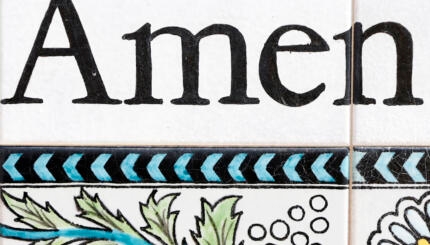Every morning, I wake up and thank God for not making me a gentile. This prayer has always seemed a little strange to me, considering that I started saying it when I was a gentile.
I was not born a Jew. In 2010, after my boyfriend (now husband) Daniel took me to a Shabbat dinner at Chabad, I fell in love with Judaism and began a five-year Orthodox conversion process that I completed in 2015.
Throughout the process, I took on different Jewish rituals slowly, including saying the morning prayers. I immediately noticed that there are both positive prayers, which thank God for various gifts we enjoy, and negative ones, where we rebuke ourselves and talk about God smiting nations that try to destroy us. As a sensitive soul, I always prefer saying the former.
The gentile prayer struck me as one of the negative ones.
With your help, My Jewish Learning can provide endless opportunities for learning, connection and discovery.
The traditional text is: Baruch atah adonai, eloheinu melech ha-olam, she-loh asani goy. “Blessed are you, Lord our God, king of the universe, who has not made me a gentile.”
The blessing is recited as part of a series of blessings known as Birkot Hashachar, literally “blessings of the morning.” It is recited in succession with two other blessings thanking God for not making you a slave and — if you’re a man — for not making you a woman. Women recite a different blessing thanking God for making us “according to his will.”
Read More: How to Convert to Judaism
Couldn’t I just do the same with the gentile prayer? Why not just thank God for making me a Jew?
Then again, God didn’t make me a Jew. I was born a non-Jew and spent the first 26 years of my life as one. And even though I’m Jewish now, all my family members are still gentiles. Is this prayer disparaging them and other non-Jews? And even if it were phrased in the positive, thanking God for making me a Jew still sounds haughty.
I set out to find out why I had to say this blessing and whether or not I was misinterpreting it.
I found a great explanation of these three blessings on Torah.org. Leah Kohn, the director of the Jewish Renaissance Center, a New York-based outreach center for women, writes that a Jew’s life mission is impossible to complete because it involves constant growth and refinement.
“The negative phrasing of all three blessings, ‘for not making me a gentile, a slave and a woman,’ conveys the humility associated with shouldering such an enormous yet meaningful task, while preserving the sense of gratitude for such a profound life purpose. By contrast, the opposite phrasing, ‘Blessed are you HaShem [God] for making me Jewish, free and a man,’ could reflect a more egocentric position, which might lead to feelings of self-satisfaction and disinterest in further spiritual growth.”
The way I have come to understand this blessing is how Kohn explains it. We are expressing thanks for the commandments and the opportunity to draw close to God. We are grateful that we have the opportunity to learn and grow and work on perfecting ourselves.
Men thank God for not making them women because there are more commandments incumbent upon men. Women thank God for making them according to God’s will because they are innately more spiritual and have ways to get closer to God that men do not, such as giving birth and being the primary overseers of children’s religious education. We all thank God for not being slaves because when we are free, we can perform more of the commandments.
It’s not that Jews are better than non-Jews, only that we have more responsibility. Any non-Jew that sincerely wants to take that on has the option of converting.
I also learned that all converts’ souls were at Sinai. These souls may have gone off the path throughout the generations, but they were there. I didn’t know it when I was younger, but God had indeed given me a Jewish soul at birth.
I sometimes still struggle with the prayers that are not particularly uplifting, like the gentile one. But over the years, I have come to understand why they are necessary. As Jews, we need to humble ourselves before God and show that we are dedicated to self-improvement. I used to dread Yom Kippur, for instance, because of all the negative-sounding prayers. However, I now love it and look forward to it, because it is a day of profound spiritual growth and connection to God.
I am thrilled for the opportunity to get closer to God on a daily basis. And through the gentile prayer and all the others, I can do just that.
Kylie Ora Lobell is a Los Angeles-based freelance writer who has been published in the Jewish Journal of LA, Aish, Chabad, Tablet, The Los Angeles Times, and the Washington Post.



